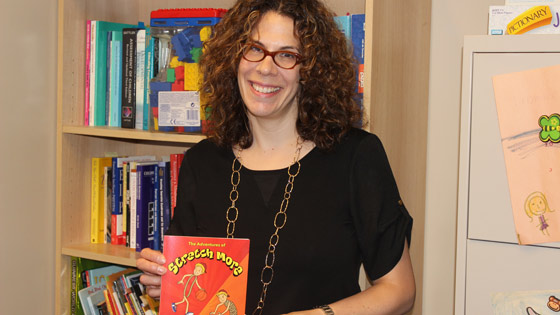 Dr. Trina Epstein, child and adolescent psychologist, wrote The Adventures of Stretch More
Dr. Trina Epstein, child and adolescent psychologist, wrote The Adventures of Stretch More to help children with behavior challenges manage meltdowns.
Soggy breakfast cereal, sitting still in class and a packed weekend schedule.
For children with ADHD, OCD, or Asperger syndrome any one of these situations could trigger social, emotional, and behavioural challenges, which sometimes results in a "meltdown".
In her new book
The Adventures of Stretch More, child and adolescent psychologist Dr. Trina Epstein, helps children and parents learn to manage these types of challenges by solving problems collaboratively.
At the Tourette Syndrome Neurodevelopmental Clinic at Toronto Western Hospital where Epstein practices, a large percent of patients with Tourette Syndrome also have other challenges beyond their tics, such as anxiety or attention difficulties.
Encouraging patients to 'stretch more'
With the help of Stretch More, the rubber band lead character, Epstein hopes the kids she works with and anyone affected by these challenges can come to understand their behaviour and why they may be feeling stuck in certain situations. The goal of the book is to highlight a way for children and their parents to manage and prevent these difficult moments.
"The traditional 'rewards and consequences' method that parents use to motivate children won't work with kids who don't yet have the skills to manage their emotions all the time," said Epstein. "It's like throwing gasoline on their fire and doesn't address what is going on beneath the surface."
In his adventures, Stretch becomes wound up tightly in knots in situations he finds difficult to handle, but when he's feeling flexible, he's able to tackle problems better.
"When my patients start to feel bunched up because something around them has set them off, I talk to them about how they can stretch their brain – to be more flexible, like elastic, in order to find a new way to handle the situation," said Epstein. "I also wanted kids to be able to relate to the character, so he has a lot of strengths but he also has his challenges."
Kids, parents work together to find proactive solutions
The book is a collection of three pick-your-path stories that ask readers to decide what happens to Stretch next, as he tries to problem solve with his parents and teacher. An introductory parent guide, and parent footnotes sprinkled throughout the stories, help give the adult reader additional guidance about the approach.
It's based on a model known as Collaborative and Proactive Solutions (CPS), which was first described by Harvard psychologist, and Epstein's co-author, Dr. Ross Greene.
The CPS model suggests that problems that appear to be behavioural often occur due to underlying skill deficits, rather than being a cry for attention or an attempt to test adults' patience.
Staying focused on a task or managing sensory sensitivities can be difficult for kids with neurodevelopmental challenges, such as Tourette's, ADHD or OCD, and this can lead to frustration and challenging behaviour, Epstein says.
The model proposes that generating collaborative and proactive solutions is the best way to address and resolve the problems.
"You want to give kids the skills to manage their frustrations," she says. "It's about trouble-shooting and problem solving with your child to learn to prevent a meltdown as opposed to only dealing with meltdowns as they happen."
Looking at parenting styles: what works, what doesn't
Working through challenging behaviour using CPS is a journey that involves reconsidering traditional parenting approaches and consistently engaging in problem solving discussions with your children.
Epstein says there are three keys steps that can get parents moving away from the reward-and-punishment parenting style.
-
Empathize and get into your kid's head
Make an effort to evaluate the situation and understand your child's concerns.
- Define the problem and explain their concerns
The second is for parents to define the problem and explain their concerns.
- Extend an invitation
Invite your child to put your heads together to figure this out. Give him or her the opportunity to propose a solution and then work together to agree on something reasonable.
Most parents often feel at a loss of what to do when their child has a meltdown, which is why
The Adventures of Stretch More is useful regardless of whether or not there is a behavioural condition. All children go through developmental stages where they have varying abilities to handle their emotions in different situations.
"Avoiding a meltdown altogether is what every parent wants, so we need to give kids the tools to help them manage their behaviour, especially when they feel like things are not going their way," said Epstein. "This book will hopefully help to fill the gap for both parents and kids who are struggling to make everyday situations easier to cope with."
To purchase The Adventures of Stretch More, please visit:
Woodbine House or
Amazon.
